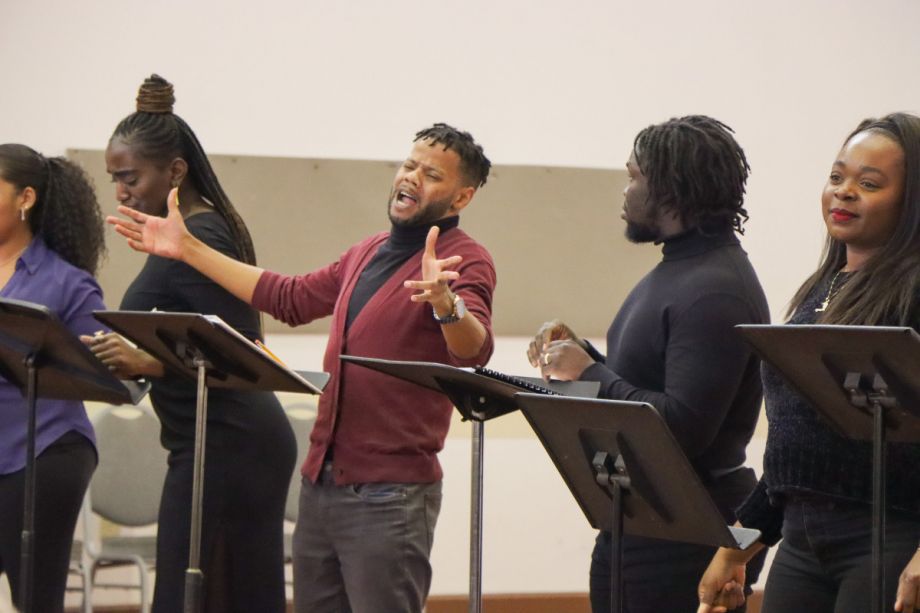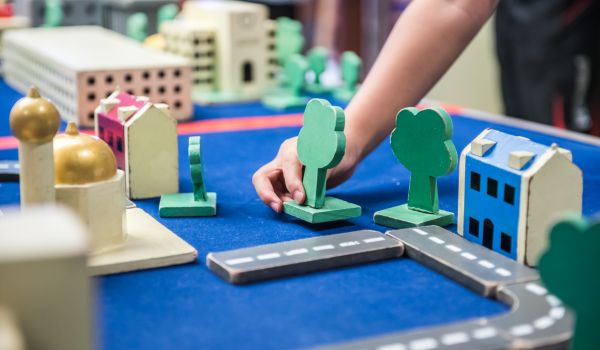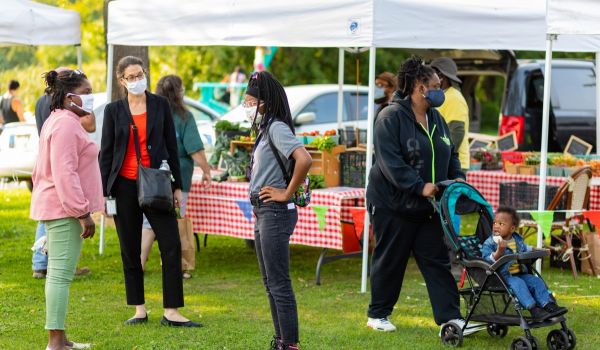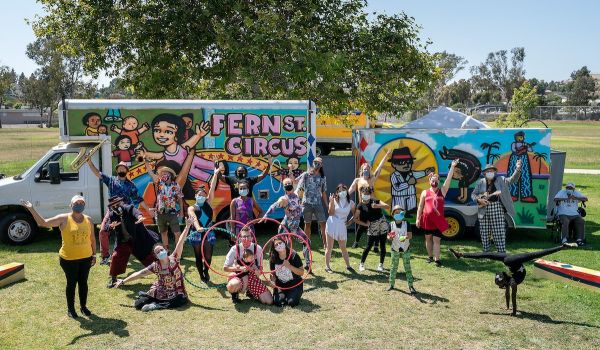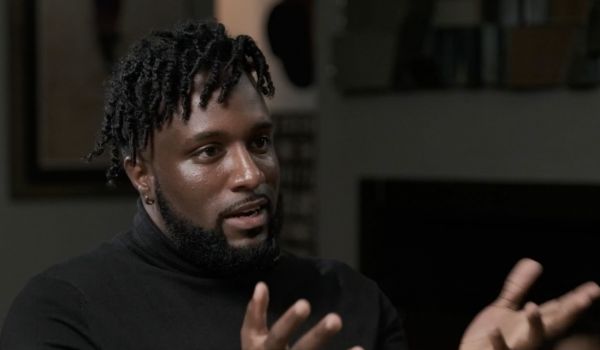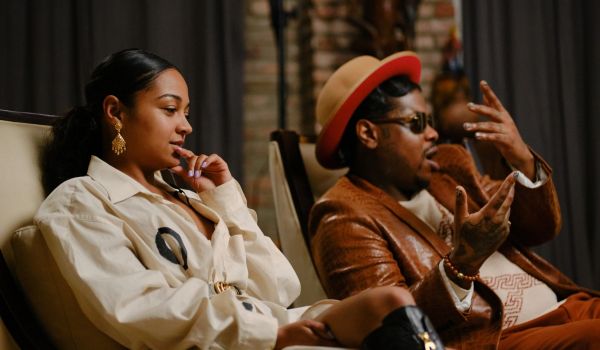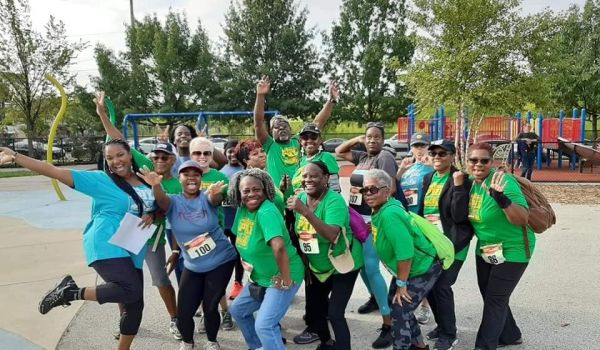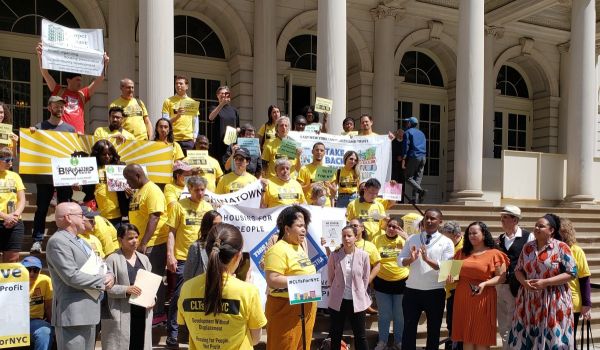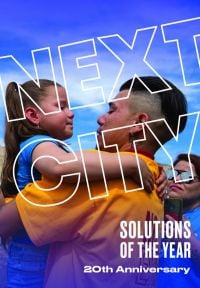A daring new opera commissioning model is being piloted at Opera Theatre of St. Louis over the next three years, one that puts local community curators at the helm of its artistic decision making.
It was in January, as the Omicron variant surged across the country, that the opera theatre first brought the New Works Collective, comprising 10 local producing artists, academics, activists and writers, together online.
Their charge? To build an equitable commissioning process that accounted for disparities in representation at the level of musical composition and narrative.
“This is our passion project,” says Nicole Ambos Freber, OTSL’s managing director of advancement and a native of St. Louis. “It ties so closely to the goals of our strategic plan – fostering the next generation of talent, engaging the community in dialogue and conversation, and using art and storytelling to bring up the issues that are important to the community.”
Over the past year, the collective of St. Louis residents has designed OTSL’s first ever national call for new work and devised a new evaluation process that seeks to avoid replicating inequity by removing all extraneous barriers and flinging open the gates. Interest and commitment to creating operas reflective of community concerns were prioritized over past musical experience or institutional affiliation or prestige. Applicants who preferred to speak rather than write about their proposed works were allowed to submit in video format.
They received 133 applications, interviewed 12 sets of finalists and selected three teams who will develop their compositions over the winter and present their 20-minute chamber operas to the public in March 2023.
Freber says the NWC was sparked when she began thinking about two seemingly unrelated questions in tandem. The first question came from members of their council on engagement and inclusion, an advisory group established in 2011.
“They kept asking us, ‘Why do you get to decide what the operas are? How come we never get to decide?’” Freber recalls. The second challenge was from a trusted funder. “In the last grant cycle, they basically said to us, ‘If you could do something really innovative and disruptive, what would it be?’”
OTSL’s answer was to take a systemic risk, albeit a limited one, to combine the idea of bringing new voices into the art form— first-time creators and people who are new to opera— and simultaneously bringing in new decision makers.
“We thought, how exciting to have this work really centered in our communities,” she says, “and to find out what stories our communities want us to tell.”
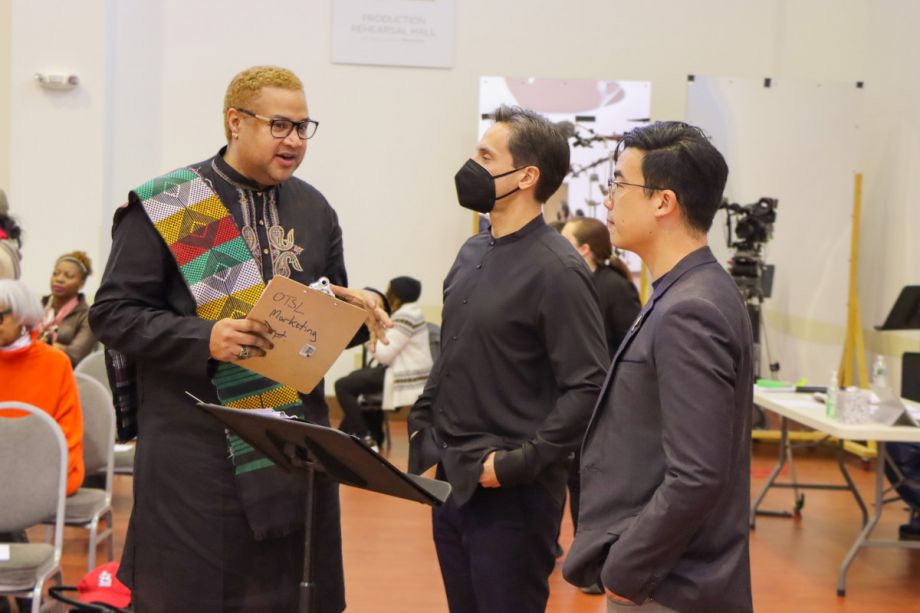
Stage director Rajendra Ramoon Maharaj, pictured on the far left, directed the collective's commissioned projects. Here, he offers guidance on “Slanted: An American Rock Opera,” by Simon Tam and Joe X. Jiang. (Photo by Macy White / OTSL)
The NWC is modeling an egalitarian practice not typically experienced in well-established and well-heeled arts organizations (OTSL reported assets in 2020 of over $100 million), spaces where leadership is usually reserved for maestros, impresarios, artistic directors and general managers.
Even without Baroque trappings of powdered periwigs and high lace collars, those roles dictate the season and budgets, and have total say over commissions of new repertoire.
Responding to the 2021 Metropolitan Opera production of “Fire Shut Up in My Bones,” an OTSL commission set in the Louisiana provinces, some Black opera and theatre artists in Louisiana were troubled by the gravity of the subject matter – child sexual abuse and other betrayals – which they feared offered a stereotypically pathologized view of Black life. Some local critics said they found parts of it hard to digest and lamented that, after 138 years of composer apartheid, a more uplifting story was not selected for the first Black opera staged at the Met.
The collective’s experimental alternative structure seeks to move OTSL’s investment in equity, inclusion and diversity beyond a commitment to representation – to something more akin to representation plus real decision-making power and resource sharing.
NWC member Jacqueline Thompson is glad to see this level of meaningful consultation. A native St. Louisan, working actor, director and associate professor in the media and communications department at the University of Missouri in St. Louis, she’s already committed to year two.
“I understand specifically how hard it is for St. Louis artists to get support, experience and visibility,” Thompson says. “Being on the inside is all about accessibility, and also being a champion, an advocate and very, very intentional about lifting up those voices specifically in my community.”
Thompson had just returned from getting her MFA in acting in Louisville when Ferguson police officer Darren Wilson killed 18-year-old Mike Brown. As the city exploded in righteous outrage, the demands of the moment pushed her into an artistic leadership position. “I don’t even know if I had the language, confidence and grit to be able to navigate it,” she says. But she clung to her guiding principle: “Not to be victims of vulture culture, not to let people make profit off our pain.”
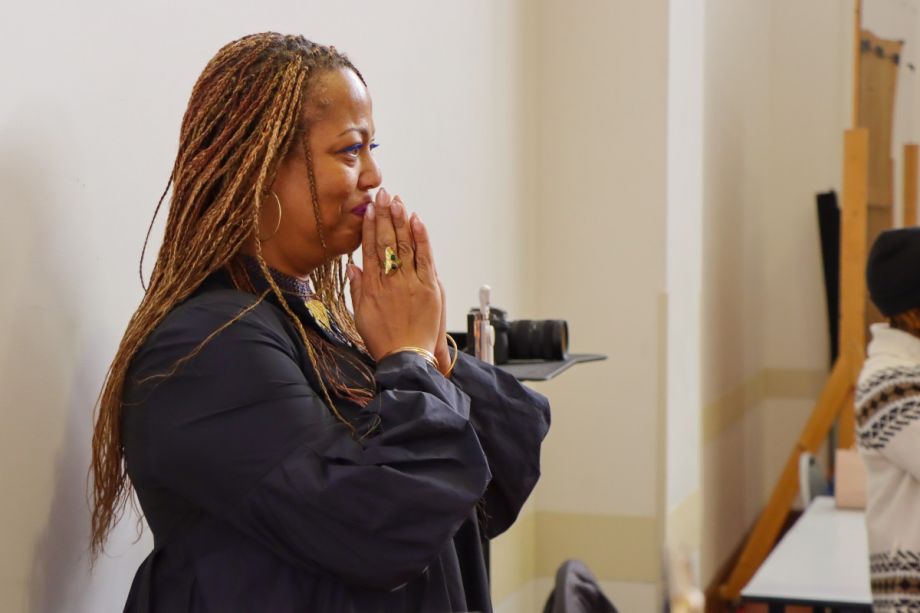
Librettist Samiya Bashir (pictured) and composer Del’Shawn Taylor's “Cook Shack,” which celebrates Black female empowerment, will also premiere in March. (Photo by Macy White / OTSL)
NWC set a criteria that at least one of the operas must be created by a St. Louisan. The collective selected Tre’von Griffith, who holds a master’s degree from Berklee College of Music, to be the standard bearer. He’ll be doing double duty as composer and librettist for his opera, set in the drag ball milieu of the Harlem Renaissance during the Roaring Twenties.
“I’m a little Black queer kid from North St. Louis, born to a teenage mother, and all the statistics say I shouldn’t be in the position I am today,” Griffith says. He views the Harlem drag ball phenomenon as an origin story for the subculture of Black queerdom in which he and his friends are flourishing today, and he means to pay it homage.
His opera follows a brother and sister who migrate from the Jim Crow South to Harlem, and at the balls find a sense of serenity and happiness that was previously unimaginable to them. But then there’s a police raid, and…well…that’s as far as he’s gotten.
“You see people living truthfully, having a good time, being and existing in their own safe space, and then, for no reason, they have police in there,” he laments. “I think we need to remind people, that’s the reality for a lot of people.”
Thompson says there has been the occasional tense moment with OTSL, but that shouldn’t be a surprise. Making mistakes and learning is part of the process of taking risks, she says.
“We are experimenting, and finding the process to do this in the most useful, productive way,” Thompson tells Next City. “A lot of institutions are afraid to do it the wrong way, so they don’t do anything at all. But sometimes you just kind of get in there, take the risk and actually do the work.”
Frances Madeson is a freelance journalist in central Louisiana.

